

AAAS: the new meat. Onderzoekers werken aan kweekhamburger. AMSTERDAM - Nederlandse wetenschappers hopen aan het eind van dit jaar de eerste kweekhamburger te presenteren.
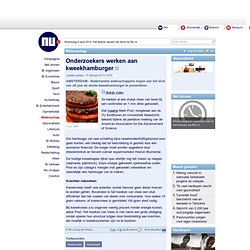
Foto: ANP Bekijk video Ze hebben al een stukje vlees van twee bij een centimeter en 1 mm dikte gekweekt. Dat maakte Mark Post, hoogleraar aan de TU Eindhoven en Universiteit Maastricht, bekend tijdens de jaarlijkse meeting van de American Association for the Advancement of Science Die hamburger zal naar schatting bijna tweehonderdvijftigduizend euro gaan kosten, een bedrag dat ter beschikking is gesteld door een anonieme financier. De huidige kweeklapjes lijken qua uiterlijk nog het meest op reepjes calamares (pijlinktvis). Krachten nabootsen Kweekvlees heeft veel potentie, omdat hiervoor geen dieren hoeven te worden gefokt. Bij kweekvlees zou ongeveer veertig procent minder energie kosten, aldus Post. Kweekhamburger in de maak.
Mark Post. Prof.dr. M.J. Vitro Meat & Cell Culture. Test tube hamburgers to be served this year. Speaking at the American Academy for the Advancement of Science (AAAS) annual meeting in Vancouver yesterday afternoon (SUNDAY), Prof Post said his team has successfully replicated the process with cow cells and calf serum, bringing the first artificial burger a step closer.
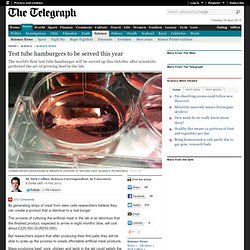
Vegan campaigners savour test tube burger breakthrough. Scientists turn stem cells into pork - Technology & science - Innovation. LONDON — Call it pork in a petri dish — a technique to turn pig stem cells into strips of meat that scientists say could one day offer a green alternative to raising livestock, help alleviate world hunger, and save some pigs their bacon.
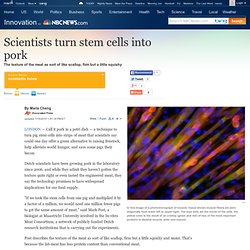
Dutch scientists have been growing pork in the laboratory since 2006, and while they admit they haven't gotten the texture quite right or even tasted the engineered meat, they say the technology promises to have widespread implications for our food supply. "If we took the stem cells from one pig and multiplied it by a factor of a million, we would need one million fewer pigs to get the same amount of meat," said Mark Post, a biologist at Maastricht University involved in the In-vitro Meat Consortium, a network of publicly funded Dutch research institutions that is carrying out the experiments. Post describes the texture of the meat as sort of like scallop, firm but a little squishy and moist. There are tantalizing health possibilities in the technology. ScienceGuide: Stem cell-burger unveiled.
5 augustus 2013 - On Monday Professor Mark Post (Maastricht University) presents his €300.000 worth hamburger made from meat that was grown in a lab.
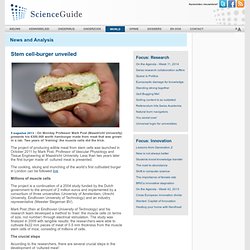
Two years of ‘training’ the muscle cells did the trick. The project of producing edible meat from stem cells was launched in October 2011 by Mark Post, Professor of Vascular Physiology and Tissue Engineering at Maastricht University. Less than two years later the first burger made of cultured meat is presented. The cooking, slicing and munching of the world’s first cultivated burger in London can be followed live. Test Tube Burger - Video. Engineering the $325,000 In-Vitro Burger. The hamburger, assembled from tiny bits of beef muscle tissue grown in a laboratory and to be cooked and eaten at an event in London, perhaps in a few weeks, is meant to show the world — including potential sources of research funds — that so-called in vitro meat, or cultured meat, is a reality.
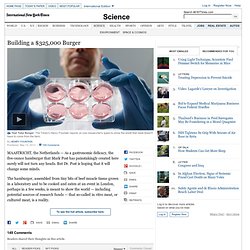
“Let’s make a proof of concept, and change the discussion from ‘this is never going to work’ to, ‘well, we actually showed that it works, but now we need to get funding and work on it,’ “ Dr. Post said in an interview last fall in his office at Maastricht University. Down the hall, in a lab with incubators filled with clear plastic containers holding a pinkish liquid, a technician was tending to the delicate task of growing the tens of billions of cells needed to make the burger, starting with a particular type of cell removed from cow necks obtained at a slaughterhouse.
Dr. Yet growing meat in the laboratory has proved difficult and devilishly expensive. “This is something very new,” Dr. Dr. Dr. A Lab-Grown Burger Gets a Taste Test. Cultured Beef. Google's Sergey Brin bankrolled world's first synthetic beef hamburger. The man who has bankrolled the production of the world's first lab-grown hamburger has been revealed as Google co-founder Sergey Brin.
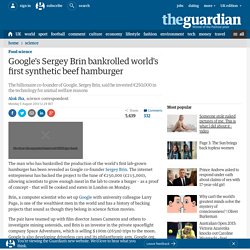
The internet entrepreneur has backed the project to the tune of €250,000 (£215,000), allowing scientists to grow enough meat in the lab to create a burger – as a proof of concept – that will be cooked and eaten in London on Monday. Brin, a computer scientist who set up Google with university colleague Larry Page, is one of the wealthiest men in the world and has a history of backing projects that sound as though they belong in science fiction movies. The pair have teamed up with film director James Cameron and others to investigate mining asteroids, and Brin is an investor in the private spaceflight company Space Adventures, which is selling $100m (£65m) trips to the moon. Google is also developing driverless cars and its philanthropic arm, Google.org, has invested in green energy projects. ScienceGuide: Wereldpodium voor kweekhamburger. Advalvas: Fresco Leve de hamburger!
Streven naar een volledig vegetarische wereld is niet verstandig, vindt Louise Fresco.
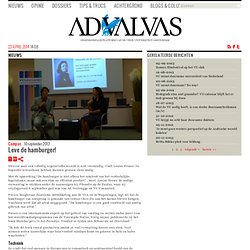
EM: De ereburger van de VS. De klok slaat half 10 in een verlaten wegrestaurant in Kansas City; de 70-jarige eigenaar achter de kassa flipt nog een hamburger en de vaste stamgast gooit nog een quarter in de pinball machine.
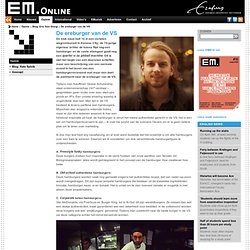
Dit is niet het begin van een doorsnee actiefilm, maar een beschrijving van een normale avond in het leven van een hamburgerrecensent met maar één doel: de zoektocht naar de ereburger van de VS. Tijdens mijn Kauffman Global Scholarship staat ondernemerschap 24/7 centraal – gesprekken gaan louter over lean start-ups, pivots en IP’s.